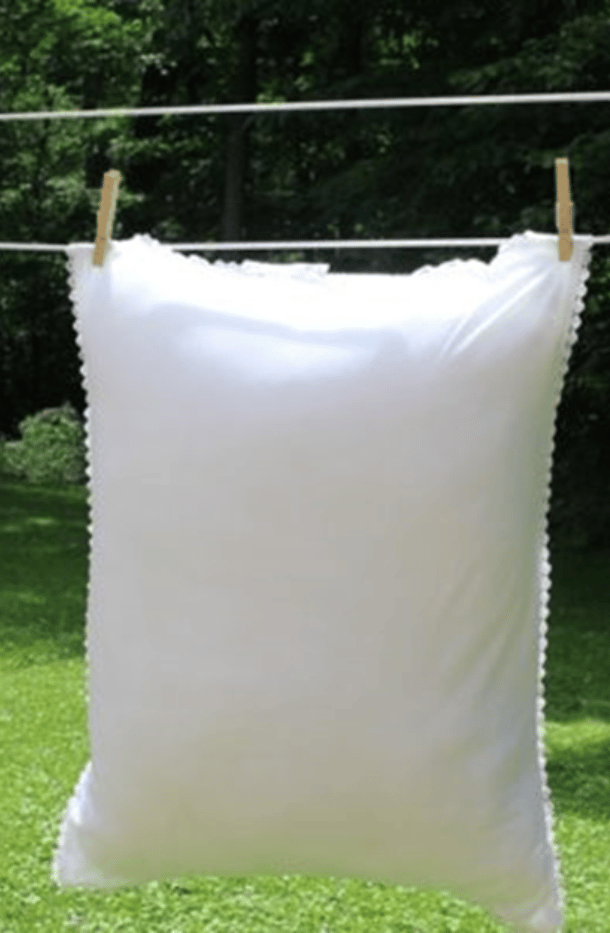Why Proper Care of Organic Cotton Pillows Matters
Keeping organic cotton pillows clean is not just about maintaining their appearance; it directly impacts your health. These pillows are naturally hypoallergenic, which means they resist common allergens like dust mites, mold, and bacteria. However, without regular cleaning, even organic cotton pillows can accumulate these allergens, which may lead to respiratory issues, skin irritations, and disrupted sleep—particularly for sensitive groups such as children and pregnant women.
Learning how to wash organic cotton pillows can greatly improve indoor air quality and overall well-being. By doing so, you prevent the buildup of allergens, dust mites, and bacteria, keeping your pillow fresh and hygienic.
This practice of regular cleaning is particularly beneficial for individuals prone to allergies or asthma. Ensuring a clean pillow can significantly enhance sleep quality, leading to restful nights and fewer health concerns. By incorporating organic cotton pillow washing into your routine, you’ll breathe easier, sleep better, and wake up feeling refreshed.

Extending the Lifespan of Organic Cotton Pillows
Proper washing and maintenance also extend the lifespan of your organic cotton pillows. With time, oils from your skin, dust, and environmental pollutants can degrade the fibers of the pillow, making it lose its comfort and support. By regularly washing the pillow using the right techniques, you help preserve its softness, structure, and integrity, ensuring that it remains both comfortable and eco-friendly for years to come.

Not only does this save you money in the long run by reducing the need for frequent replacements, but it also aligns with sustainable living practices. Prolonging the use of your pillow reduces waste and minimizes the environmental impact, making it a responsible choice for eco-conscious households.
How to Wash Organic Cotton Pillows
To maintain the quality of your organic cotton pillow, it’s essential to follow the proper washing procedures.
Step-by-Step Guide to Washing Organic Cotton Pillows
Here’s a step-by-step guide to help you care for your pillow:
1. Check the Label:
Always start by checking the care label on the pillow. Some organic cotton pillows may have specific washing instructions.
2. Spot Clean:
Before full washing, spot-clean any stains using a mild detergent or an eco-friendly soap solution.
3. Prepare for Washing:
If machine washing, use a gentle cycle with cold water to prevent shrinking or damaging the cotton fibers.
4. Use a Mild Detergent:
Choose a non-toxic, mild detergent that won’t compromise the pillow’s organic properties.
5. Rinse Thoroughly:
Ensure all detergent is rinsed out of the pillow to prevent residue buildup.
How to Hand Wash Organic Cotton Pillows
Hand washing is often the best option for organic cotton pillows, as it minimizes wear and tear on the fabric. Here’s how to hand wash them effectively:

1. Fill a Basin:
Use lukewarm water and a small amount of mild detergent in a basin.
2. Gently Agitate:
Submerge the pillow and gently agitate the water to loosen dirt. Avoid harsh scrubbing, which could damage the cotton fibers.
3. Rinse:
Drain the soapy water and rinse the pillow thoroughly under cool running water until all soap is removed.
4. Press, Don’t Wring:
Press the pillow to remove excess water, but never wring it out, as this could distort its shape.
5. Air Dry:
Lay the pillow flat to air dry (more on drying later).
How to Machine Wash Organic Cotton Pillows?
You can machine wash most organic cotton pillows, but it’s crucial to follow the correct settings to avoid damage. Here’s what to keep in mind:

1. Use a Gentle Cycle
Always set your washing machine to a gentle cycle to protect the organic cotton fibers.
2. Cold Water Only:
Opt for cold water, as warm or hot water can shrink or weaken the pillow.
3. Low Spin:
To prevent the pillow from becoming too compressed, use a low spin cycle.
Machine washing is convenient, but if done too frequently or without care, it may shorten the lifespan of your pillow. Be mindful of how often you machine wash, and opt for hand washing when possible.
How to Dry Organic Cotton Pillows
Air Drying vs. Machine Drying: Which is Best?
When it comes to drying organic cotton pillows, air drying is generally the best method. It ensures the fibers maintain their structure and prevents shrinkage. Additionally, air drying is energy-efficient, supporting an eco-conscious lifestyle.

● Pros of Air Drying:
- Preserves the pillow’s natural softness and shape.
- Prevents shrinking and overheating.
- Best for maintaining the pillow’s organic properties.
● Cons of Air Drying:
- It can take longer, especially in humid environments.
If you’re short on time, you may use a dryer, but be sure to choose the correct settings to avoid any damage.
How to Dry Organic Cotton Pillows in a Machine

For those who prefer machine drying, here are some essential tips:
1. Low Heat Setting:
Always use the lowest heat setting to prevent the cotton from shrinking or the fill from becoming uneven.
2. Use Dryer Balls:
Add dryer balls to the dryer to help fluff the pillow and ensure even drying.
3. Check Frequently:
Stop the dryer occasionally to check on the pillow and fluff it manually if needed.
Machine drying can be convenient, but over-drying or using high heat can shorten the pillow’s lifespan. Be cautious to prevent overheating, which can affect the softness and texture of the cotton.
Pillow Maintenance Tips for Organic Cotton Pillows
How to Fluff Organic Cotton Pillows After Washing
After washing your organic cotton pillow, fluffing is crucial to restore its shape and maintain its comfort. Without proper fluffing, the pillow can become flat or lumpy, affecting its support and durability.
Here’s how you can fluff your pillow correctly:

1. Shake the Pillow:
Hold the pillow by its corners and give it a few good shakes to redistribute the fill.
2. Press and Pull:
Press the pillow gently and then pull it apart from the sides to help it regain its original loft.
3. Use Dryer Balls:
If you’re using a dryer, adding dryer balls or clean tennis balls can help fluff the pillow evenly by moving the filling around as it dries.
4. Air it Out:
Once dried, let the pillow air out for a few hours to ensure it’s completely dry and fluffy.
Fluffing helps prevent the fill from clumping together and ensures the pillow continues to provide comfort and support.
How Often to Wash and Replace Organic Cotton Pillows
To maintain hygiene and prolong the lifespan of your organic cotton pillow, it’s essential to wash and replace it at appropriate intervals. Here are some general guidelines:
● Washing Frequency:
Ideally, wash your organic cotton pillow every 3-6 months. However, if you’re using a pillow protector, you can wash it less frequently, around every 6 months. Regular washing helps remove allergens, dust, and oils that can accumulate over time.
● Replacement Schedule:
Organic cotton pillows typically last around 2-3 years with proper care. Signs that it’s time to replace your pillow include noticeable flattening, lumps that can’t be fluffed out, or if the pillow no longer provides adequate support.
Keeping a consistent washing and replacement routine not only extends the life of your pillow but also promotes better sleep hygiene, leading to improved sleep quality.
Best Pillow Protectors for Organic Cotton Pillows
Why Use a Pillow Protector
Using a pillow protector is an excellent way to reduce the frequency of washing your organic cotton pillow while protecting it from spills, stains, and dust mites. Pillow protectors act as a barrier between your pillow and the environment, keeping it clean and fresh for longer.
They are especially useful if you have allergies or sensitive skin, as they can prevent dust mites and allergens from penetrating the pillow.

In addition to maintaining cleanliness, a pillow protector can significantly extend the lifespan of your pillow by preventing wear and tear caused by frequent washing.
Eco-Friendly Pillow Protector Options
To complement the eco-friendly nature of your organic cotton pillow, it’s essential to choose a pillow protector made from sustainable, non-toxic materials. Here are some top eco-friendly options:
1. Organic Cotton Pillow Protectors:
These protectors are made from natural, breathable fibers that are gentle on the skin and free from harmful chemicals.
2. Bamboo Pillow Protectors:
Bamboo fabric is naturally antimicrobial, breathable, and moisture-wicking, making it an excellent eco-conscious choice.
3. Tencel Pillow Protectors:
Tencel, made from sustainably harvested wood pulp, is another great option. It’s soft, breathable, and highly durable.
Choosing the right eco-friendly pillow protector helps maintain the organic nature of your bedding, ensuring a healthier sleep environment.
Common Mistakes to Avoid When Washing Organic Cotton Pillows
Overwashing and Using Harsh Chemicals
Overwashing or using harsh chemicals can do more harm than good when it comes to organic cotton pillows. Washing your pillow too frequently can break down the natural fibers, causing the pillow to lose its softness and support.
Additionally, using strong detergents with chemicals can damage the organic properties of the pillow and cause skin irritation.
● Avoid These Mistakes:
○ Using Bleach or Harsh Detergents: Opt for mild, eco-friendly detergents instead.
○ Overwashing: Follow the recommended washing schedule to avoid weakening the fibers.
Maintaining a balanced washing routine with gentle, non-toxic cleaning solutions will preserve the pillow’s quality and extend its lifespan.
Not Drying Properly
Failing to dry organic cotton pillows thoroughly can lead to mold and mildew growth, which poses significant health risks. Here’s how to avoid this common mistake:
1. Ensure Complete Drying: Whether air drying or using a dryer, make sure the pillow is fully dry before use. Any residual moisture can encourage mold growth inside the pillow.
2. Flip and Fluff Regularly: If air drying, flip the pillow periodically to ensure all areas are evenly dried.
3. Use Dryer Balls: As mentioned earlier, using dryer balls can help the pillow dry more thoroughly and prevent clumping of the fill.
Proper drying not only prevents mold and mildew but also helps maintain the pillow’s softness and comfort.
Final Checklist for Washing and Maintaining Organic Cotton Pillows
Taking care of your organic cotton pillows doesn’t have to be complicated. By following a few simple steps, you can ensure their longevity, comfort, and cleanliness. Here’s a concise checklist to help you keep your pillows in top shape:
Step-by-Step Summary for Organic Cotton Pillow Care:
1. Wash Frequency: Wash your organic cotton pillows every 3-6 months or sooner if they become dirty or start to smell.
2. Pre-Treatment: If there are stains, spot clean with a gentle, eco-friendly detergent before full washing.
3. Machine Washing: Use a gentle cycle with cold water. Avoid bleach and harsh detergents.
4. Hand Washing: Use lukewarm water and a mild detergent. Gently massage the pillow to remove dirt without damaging the fibers.
5. Drying: Air drying is recommended for maintaining pillow shape. If using a dryer, use the low heat setting and add dryer balls.
6. Fluffing: Fluff the pillow regularly after washing and drying to maintain its shape and comfort.
7. Pillow Protectors: Use eco-friendly pillow protectors to extend the time between washes and add a layer of protection against allergens and stains.
Table for Quick Reference
| Care Task | Recommended Action |
| Washing Frequency | Every 3-6 months |
| Pre-Treatment for Stains | Spot clean with eco-friendly detergent |
| Machine Washing | Gentle cycle, cold water, mild detergent |
| Hand Washing | Lukewarm water, mild detergent, avoid wringing |
| Drying | Air drying preferred; low heat in dryer with dryer balls if necessary |
| Fluffing | Fluff after drying to maintain shape |
| Pillow Protector Use | Use eco-friendly protectors to extend time between washes |
Conclusion
By learning how to wash organic cotton pillows and incorporating simple care habits, you unlock their full potential. Proper maintenance ensures these eco-friendly pillows retain their comfort, support, and health benefits. Regularly washing your organic cotton pillows prevents allergen and bacteria buildup, while gentle drying, fluffing, and using protective covers maintain their shape and loft.
This thoughtful approach not only prolongs the life of your pillows but also promotes a healthier sleep environment and sustainable living. Investing in organic cotton pillows and caring for them diligently is a small yet significant step toward prioritizing sleep hygiene, well-being, and an eco-conscious lifestyle.
More to Explore:
Bamboo Pillows
Natural Latex Pillows
Organic Cotton Pillows
FAQs:
How often should I wash organic cotton pillows?
It’s generally recommended to wash organic cotton pillows every 3-6 months. This ensures that dust mites, allergens, and bacteria do not accumulate, keeping the pillow clean and hypoallergenic. If you’re using a pillow protector, you may not need to wash the pillow as frequently.
Can I machine-wash organic cotton pillows?
Yes, you can machine wash organic cotton pillows, but it’s important to use a gentle cycle with cold water. Avoid harsh detergents and fabric softeners that can damage the natural fibers. Make sure to follow the manufacturer’s instructions for best results.
How do I properly dry organic cotton pillows?
Air drying is the safest option for organic cotton pillows as it helps maintain the fabric’s integrity. If you need to use a dryer, select the lowest heat setting and use dryer balls to help the pillow dry evenly and maintain fluffiness. Be sure the pillow is completely dry before using it to avoid mold or mildew growth.
What are the best pillow protectors for organic cotton pillows?
Opt for organic cotton or bamboo pillow protectors that are breathable, hypoallergenic, and eco-friendly. These materials will protect the pillow from stains and allergens while maintaining the integrity of the organic cotton.
How long do organic cotton pillows typically last?
With proper care, organic cotton pillows can last 2-3 years. You’ll know it’s time to replace the pillow when it loses its shape, becomes lumpy, or no longer provides adequate support. Using pillow protectors can extend the lifespan.
















